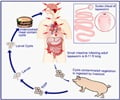Cancer-linked chemicals had been found in cows as well as pigs, but Ireland's officials insisted the risk to human health was minimal.
Cancer-linked chemicals had been found in cows as well as pigs, but Ireland's officials insisted the risk to human health was minimal.
Farm minister Brendan Smith said only three cattle herds had shown illegal levels of dioxins, the substance which led to a domestic and international recall of Irish pork products at the weekend.Officials said there would be no total recall of beef, Ireland's most important agricultural product which is worth 2.5 billion euros (3.2 billion dollars) annually.
"To all intents and purposes this is not a public health issue," Smith said, adding that the public risks "are extremely low".
"We do not expect to see symptoms occurring as a consequence in this," he told journalists in Dublin.
"The results show that eight out of the 11 herds are clear and three are above the proposed legislative limits" for the dioxins, which stemmed from contaminated animal feed, Smith said.
"This would make the samples technically non-compliant but not at a level that would pose any public health concern," he added.
Dr. Alan Reilly of the Food Safety Authority of Ireland said that on the three farms that showed signs of dioxins "they were only two to three times above the limits".
Reilly said in the case of the cows, "the adverse health effects for consumption over a short period of this type of elevated level is not going to adversely affect public health so we are not concerned."
The lower level of contamination in cows can be explained by the fact cattle are largely fed on grass, and because beef is often stored to age before being sold - much of the meat produced during the scare would still be in storage.
"The products that we have in store from the farms that have tested positive and above this particular limit, that produce will not be allowed onto the market," Reilly said.
The three farms affected have been sealed off and all the cattle there will be tested.
Ireland sounded the alarm on Saturday, recalling all pork products made since September 1 after dioxins, which in high doses can cause cancer, were found in slaughtered pigs thought to have eaten tainted feed.
The European Commission said Monday that 12 EU states and nine other countries around the world including Japan and South Korea might have received contaminated pork or pig meat products.
With pig meat processors warning that 6,000 jobs are at risk in their industry as a result of the scare, Irish Prime Minister Brian Cowen told parliament Tuesday he wanted pork back on the market as soon as possible.
Cowen said the government had shown "zero tolerance" of any contaminated meat and Dublin was taking a three-pronged approach.
Pig or beef herds that had shown contamination would be destroyed, an EU risk analysis would be used to ensure a range of products are safe and marketable and then slaughtering and processing would be restored.
The European Commission confirmed on Tuesday that the source of the dioxin contamination was a plant in southeast Ireland which recycles bread and dough to make animal feed.
A spokesman for the EU farm commissioner said there was "no legal basis" for Brussels to compensate Irish farmers affected by the crisis, after Cowen said he would ask for European financial assistance.
Source-AFP
SPH
 MEDINDIA
MEDINDIA




 Email
Email










